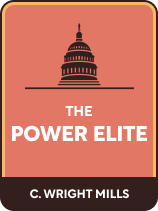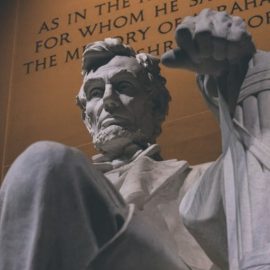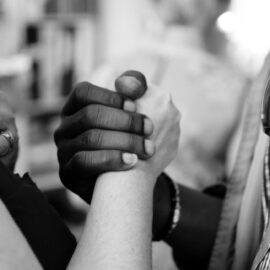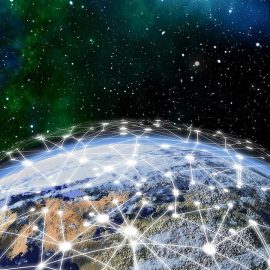

This article is an excerpt from the Shortform book guide to "The Power Elite" by C. Wright Mills. Shortform has the world's best summaries and analyses of books you should be reading.
Like this article? Sign up for a free trial here.
Who are the power elite in America? What institutions wield influence over nearly everything?
In The Power Elite, sociologist C. Wright Mills discusses how a small group of leaders has taken over a vast majority of American political and economic decision-making. He defines the power elite—who they are and how they operate—and he identifies the three institutions where the power elite emerged.
Keep reading to learn who these people are and how they’ve consolidated their power.
Defining the Power Elite
Who are the power elite in America? According to Mills, the power elite are leaders in business, the military, and politics who have outsized influence on the country. These elites aren’t stuck in one particular sphere, but, instead, often transition from private companies to government positions and back again throughout their careers. What truly defines the power elite, then, is less what they do and more how much influence they have over the economy, politics, and the lives of average Americans.
To elaborate on his definition, Mills emphasizes three aspects of the power elite: social coordination, varying levels of competence, and a focus on money over morality.
Social Coordination
According to Mills, the power elite are a coordinated class rather than a bunch of disorganized and competing individuals. Besides working together in their professional lives, the power elite have a much deeper level of social integration. Most of the power elite go to the same exclusive preparatory schools and universities and join the same social clubs. These social institutions aren’t just symbols of prestige—they also allow the young, up-and-coming elite to network, get to know each other, and develop a common way of viewing the world.
(Shortform note: To understand Mills’s theory of elite coordination, let’s look at an opposing view: the theory of checks and balances. According to this theory, competition among political elites prevents them from gaining too much power. Famously, the United States Constitution contains a number of rules allowing different branches of government to limit or “check” each other’s power, something many conservative and liberal analysts alike argue is crucial for democracy. Mills’s critique suggests checks and balances are flawed because they fail to recognize that political competition isn’t between branches of government but rather between overall interests—so when elites control all three branches, they will choose not to limit the power of their class.)
Varying Competence
Mills strongly disagrees with the idea that elites are uniquely competent or intelligent. He notes that many modern elites are born to already-wealthy families and merely inherit a great deal of their influence. Others who join the power elite do so not by displaying incredible competence but by getting existing elites to know and trust them (often by joining the various social institutions discussed above). Elites don’t need to be competent to exercise their power either, says Mills—they can and do hire committees, advisors, and consultants to help them make decisions.
(Shortform note: For an example of the kinds of advisors helping powerful people make decisions, we can look to when The Power Elite was written. Mills wrote during the rise of the think tank—groups of academics who do research, write articles, or even draft legislation on behalf of governments, businesses, and other political organizations. After World War II, think tanks evolved from temporary study groups into full-time staffed institutions, particularly in the United States. Think tanks typically work toward a particular goal or take a particular political stance, providing ideas and research that similar-minded politicians, bureaucrats, and corporate executives can use to achieve their own ends.)
Money and Power Over Morality
According to Mills, being elite requires a person to emphasize money and power over everything else—moral concerns and values only get in the way. The bureaucratic and corporate structures of the elite allow them to distance themselves from the harm their actions might cause—instead of directly witnessing the consequences, they just hear about the political or monetary benefits of those actions in a boardroom meeting. Meanwhile, everyone below the elites in the hierarchy can avoid feeling guilty about their actions because they’re just following orders from above.
(Shortform note: The corporate and bureaucratic structures Mills discusses can lead to interesting moral dilemmas: When an immoral act is committed in a corporate context, should the emphasis be placed on punishing the corporation as a whole, the guilty individuals within it, or both? For example, in the 1980s, the US company National Semiconductor deliberately failed to properly test the computer chips it sold to the US Department of Defense (DoD). While National Semiconductor paid a fine as punishment, it refused to give the DoD a list of individuals responsible for the fraud—while the DoD wanted to punish each individual who participated in the fraud, National Semiconductor argued only the corporation as a whole was responsible.)
The Institutions of the Power Elite
After explaining who the power elite are, Mills then discusses how they came to control a majority of wealth and power in America. Mills says this process began after the American Civil War, as political and technological developments allowed businessmen, military generals, and politicians to exercise their influence more broadly. Those who took advantage of these developments gained enough power to shape their respective institutions, outcompete their rivals, and form a new national class of elites. We’ll explore the three main institutions where Mills believes the power elite developed:
- Corporations
- The military
- Civilian government
Institution #1: Corporations
Mills starts by discussing how an increasingly small number of corporations influence every aspect of life in America. This is the result of a long process of corporate centralization of wealth and power starting after the Civil War. Mills explores this process in three steps: competing to industrialize; shifting leadership to executives; and, finally, defining American life.
Institution #2: The Military
After discussing the power of corporate institutions, Mills then discusses the second institution in which American power has been centralized: the military. He suggests that, while the United States has been in violent conflict for almost all of its history, the nature of who fights and why they fight has changed drastically in the 20th century. He explains this process in three steps: using temporary militias, creating the professional officer corps, and going to war indefinitely.
Institution #3: Civilian Government
After discussing the centralization of the American military, Mills then turns to “civilian government”: elected officials and appointed bureaucrats. He argues that federal bureaucratic agencies have slowly gained more and more power than elected officials at every level—officials who are far more accountable to the American people. This process had three main steps: using party machinery, growing the bureaucracy, and appointing elites.

———End of Preview———
Like what you just read? Read the rest of the world's best book summary and analysis of C. Wright Mills's "The Power Elite" at Shortform.
Here's what you'll find in our full The Power Elite summary:
- How a group of corporate elite controls America's politics and economics
- How the elite exploit America's institutions for their own benefit
- A look at the dangers that arise when citizens feel powerless







You who wrote this article Are scared to call out the Highest level of the Elites because they can damage your career But someone at some point has to take a stand!!!
I’m going to take a stab at who are the Elite families in the United States,
How about the Rockefeller family Warren Buffet, the Biden, family, the Clinton family
Barack Obama and the people behind him ,
The CCP or Chinese Communist Party the Bilderberg Family the Morgan family and the Carnegie family I challenge anyone to prove me wrong!! I can tell you what they want is the destruction of the United States of America from the inside out.
I 100% agree! So sad to be an American on this day and age when America is not ran by the love of the American people!